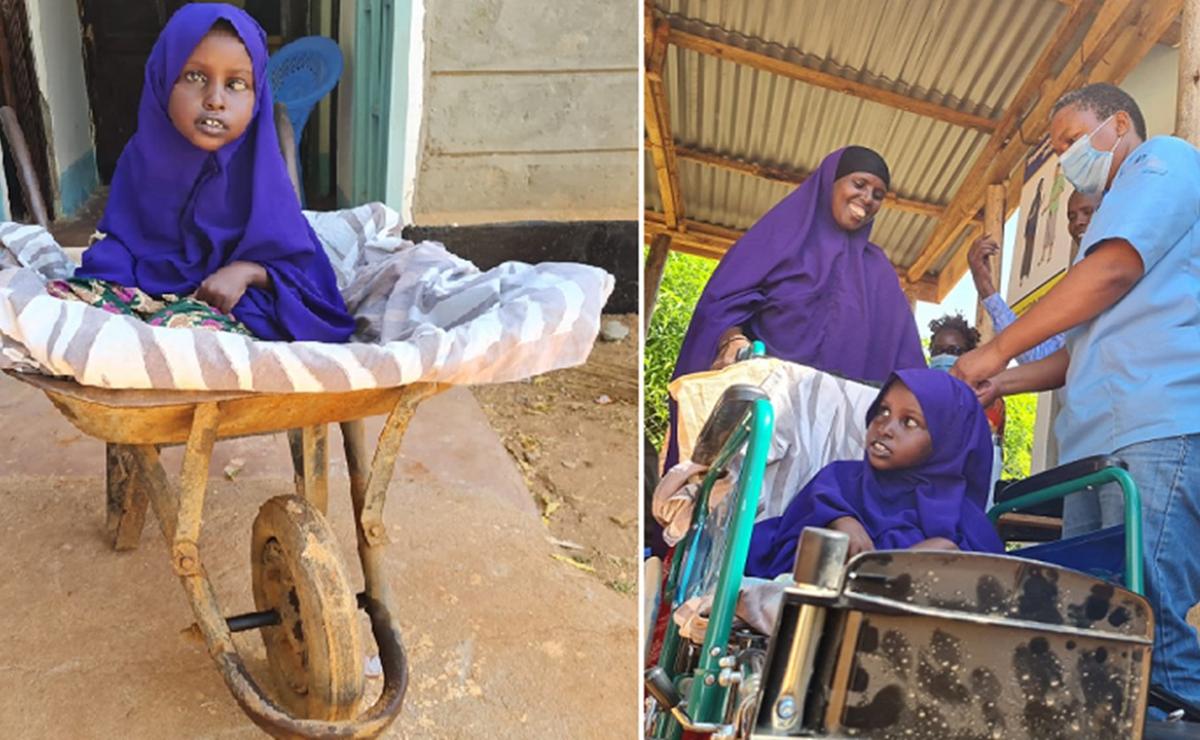New wheelchair for Fardosa

Eight-year-old Fardosa is among the first beneficiaries of wheelchairs provided by Lutheran World Federation (LWF) in partnership with the UNHCR in 2022. “A happy day for Fardosa and my entire family, from using a wheel barrow to using a wheelchair. My daughter will now have a backrest and a comfortable trip to school,” says Hawa Aden, Fardosa’s mother.
Fardosa is a young learner at Hormuud Primary School. She cannot walk to school normally like other learners do. She suffers from multiple disabilities: epilepsy and cerebral palsy. “She falls down and shakes violently when she is having an epileptic attack,” says Hawa Aden, Fardosa’s mother. Her legs are weak and thin and cannot support her weight. She has to be carried and assisted with everything that she needs.
To reach school, Hawa lifts Fardosa on to a wheelbarrow and pushes her across the Ifo Refugee Camp to school, a distance of about 400 metres. The condition of the road to school is sandy and difficult to maneouvre with the hot sun, windy and dusty conditions. She has to do the work of pushing the wheel barrow herself since her other three children are too young and equally ailing, her husband is a casual worker with two families to take care of and is away most of the time.
Children shouting: “She is carrying a dead body”
The burden of taking care of Fardosa both at home and at school has both physical, social and psychological dimensions. Hawa has to contend with ridicule and insults from children and adults in the streets of Ifo refugee Camp who poke fun at Fardosa’s disability condition. Road users such as taxi drivers, donkey-and-cart conductors and motorbike users occasionally exhibit carelessness and force her to move her wheel barrow the periphery of the road. ‘’She is carrying a dead person’, the children playing in the streets are in the habit of shouting when they see us’, says Hawa. ‘This makes me feel sad and sorry for myself and my daughter, while angry at the ignorance and unkindness of the children in the streets.’ In Dadaab, the wheelbarrow is associated with ferrying human and animal waste and generally things that are not clean as well as dead bodies occasionally when being taken to the morgue. This fuels negative perceptions from both adults and children when they see Fardosa on a wheelbarrow.
The wheel barrow was donated to Hawa by a kind-hearted neighbor called to action after he saw how Hawa was struggling to cope with her children with disabilities. Before she received it, she could carry Fardosa on her back or pay taxi drivers to take her to school. However, with no casual or formal work, she could not afford paying taxi drivers money.
New hope as LWF provides a new wheelchair
With support from the UNHCR, LWF has provided new wheelchairs to learners of Hormuud Primary School enhancing their ability to access school and boost their learning. The wheelchairs have unique functionalities including adjustable backrest, headrest and light weight to enhance maneuverability. “I am happy to transition from wheelbarrow to wheelchair. My daughter is equally happy about it although she cannot express her joy in words due to speech difficulties,” says Hawa.
“The wheelchair for schools’ project supported by UNHCR is a good example of meaningful external and internal collaboration between UNHCR and LWF, and also between Community-Based Protection (CBP) and Education departments within The LWF. Through similar activities, field expertise and best practices from the two departments can be harnessed for safer and effective learning to occur in schools managed by The LWF,” says Alex Omuhinda, Education Officer of LWF. With support from UNHCR, LWF continues to provide assistance to vulnerable children living in displacement and marginalized contexts.

